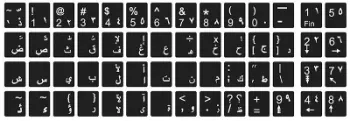Type in Arabic
1. Please reload the browser, OR
2. Open (http://www.easyarabictyping.com) on New Browser يرجى الانتظار، اللغة العربية الترجمة، حيث يتم تحميل …
Please wait, Arabic Language Translation is Loading … You can now type in Arabic in this text area …
Useful Hints for Typing in Arabic
-
Typing English words in the text area above will convert them into the closest corresponding Arabic words or script.
For example, typing "Kayf halik" will be transliterated as "كيف حالك".
- Real-time Arabic speech recognition: Converts spoken words into accurate Arabic text.
- Press Ctrl+G to switch between English and Arabic.
- Use
backspaceor click on any word to see additional options in the dropdown menu. - Once you've finished typing, you can email the text to friends and family.
- Simply copy and paste to post on Facebook or Twitter, or to format the text in an editor like Microsoft Word.
- Download and install the Arabic software on your computer. After installation, you can type in Arabic in any text editor, with or without an internet connection.
- Arabic transliteration is supported on all platforms capable of running web browsers. Only JavaScript and CSS are required, with Chrome recommended.
- This online typing software is FREE. If you'd like, you can support my by buying me a coffee.
Arabic Alphabets
Arabic Language
Arabic (العربية, pronounced /al ʕarabijja/) is a Semitic language [1] within the Afro-Asiatic language family. The language is spoken by more than 400 million people worldwide [3] across the Middle East, North Africa, and diaspora communities globally.
Modern Standard Arabic (MSA) is the standardised literary form used in formal writing, education, media, and official communication. MSA serves as the official language of 26 countries [5] and is one of the six official languages of the United Nations.
Arabic is classified as a macrolanguage [4], encompassing numerous regional dialects and varieties. Whilst MSA provides a common written standard, spoken Arabic varies significantly across regions, with dialects sometimes being mutually unintelligible.
The Arabic script is an abjad writing system [2] written from right to left, where letters represent consonants and short vowels are indicated through diacritical marks. Letters take different shapes depending on their position within a word (initial, medial, final, or isolated form).
Arabic has profoundly influenced world languages and sciences. During the Middle Ages, Arabic served as the primary medium for mathematics, science, medicine, and philosophy [6] in Europe. Words like "algebra", "algorithm", and "alkali" derive from Arabic.
The language has contributed extensively to the vocabularies of Persian, Turkish, Urdu, Hindi, Malay, Swahili, and many others. In Europe, Spanish, Portuguese, and Sicilian contain thousands of Arabic loanwords, reflecting centuries of cultural and linguistic exchange during the Islamic presence in Al-Andalus.
About Our Arabic Typing and Translation Software
How to Integrate English to Arabic Transliteration?
Google Transliteration (Google Input Tool) provides phonetic typing from English to Arabic.
Although the official tool has been deprecated, you can still integrate similar functionality using community-maintained packages. Below are practical methods to implement English-to-Arabic transliteration on your website or application.
Frequently Asked Questions (FAQs)
References:
- [1] Glottolog. "Glottolog 5.2 – Arabic". Retrieved from Glottolog: Arabic
- [2] Unicode Consortium. "The Unicode Standard Version 16.0 – Chapter 9: Arabic". Retrieved from Unicode Chapter 9: Arabic Script
- [3] United Nations. "World Arabic Language Day". Retrieved from UN: Arabic Language Day
- [4] SIL International. "ISO 639-3 Registration Authority: Arabic". Retrieved from SIL ISO 639-3: Arabic
- [5] Modern Standard Arabic (MSA): Why It's Important And When To Use It. Retrieved from Milestone Localization: MSA
- [6] Islamic world contributions to Medieval Europe. Retrieved from Islamic Contributions to Medieval Europe
Updated:

